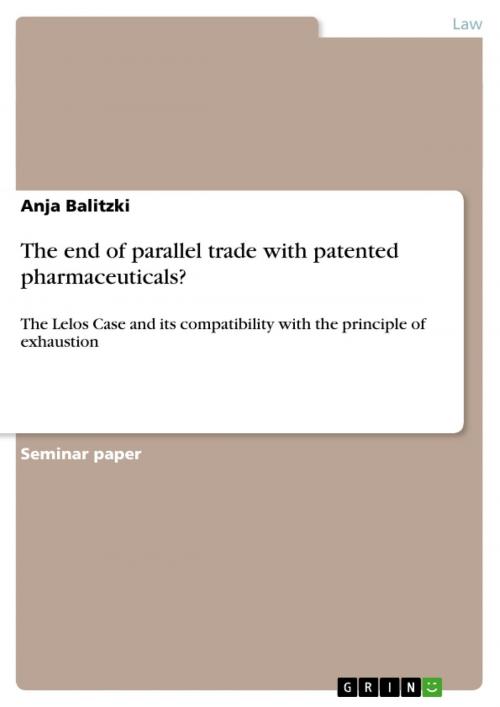The end of parallel trade with patented pharmaceuticals?
The Lelos Case and its compatibility with the principle of exhaustion
Nonfiction, Reference & Language, Law, Media & the Law| Author: | Anja Balitzki | ISBN: | 9783640454709 |
| Publisher: | GRIN Publishing | Publication: | October 22, 2009 |
| Imprint: | GRIN Publishing | Language: | English |
| Author: | Anja Balitzki |
| ISBN: | 9783640454709 |
| Publisher: | GRIN Publishing |
| Publication: | October 22, 2009 |
| Imprint: | GRIN Publishing |
| Language: | English |
Seminar paper from the year 2009 in the subject Law - Media, Multimedia Law, Copyright, grade: 1,3, Carl von Ossietzky University of Oldenburg, language: English, abstract: The pharmaceutical sector is recently in the focus of the academic literature, as it becomes more and more an important topic on the European level. Especially the relationship between patent and competition law can lead to problems and is consistently discussed. In September 2008 the ECJ had to make a decision in a case between a pharmaceutical manufacturer and his distributors, in which both fields of law played an important role. Because of these recent developments the objective of this thesis is to analyse the current relation between patent and competition law by laying the emphasis on the phenomenon of parallel trade. This work will focus on the abovementioned Lelos Case and its implications for the principle of exhaustion. It does not deal with patent or competition law in detail, but contains the most important aspects in order to explain the consequences of the ECJ's decision. Furthermore, the aspect of costs for research and development cannot be described extensively, but will be mentioned with regard to Lelos. The reason for that is the predetermined length of the thesis and the specific question, which the author has developed as a result of the Lelos Case. At first the relevant conditions on the pharmaceutical market will be briefly shown (2.) in order to explain why especially in this sector parallel trade is such an important issue. Then, the general tension between patent and competition law will be described, by depicting the most important characteristics and jurisprudence in both fields of law (3.). The next chapter deals with the Lelos Case (4.). The decision to illustrate AG Colomer's opinion is the result of his different approach to the case in comparison to the point of view of the defendant (i.e. GlaxoSmithKline). After that, a result regarding the impact of the ECJ's decision on parallel trade and the principle of exhaustion will be given (5.). In this chapter it will be shown how legal writers estimate the consequences and evolutions of the Lelos Case in practice. This thesis shall show how the ECJ has influenced parallel trade in patented pharmaceuticals in the future and what this means for the so far in EC law highly protected principle of exhaustion.
Seminar paper from the year 2009 in the subject Law - Media, Multimedia Law, Copyright, grade: 1,3, Carl von Ossietzky University of Oldenburg, language: English, abstract: The pharmaceutical sector is recently in the focus of the academic literature, as it becomes more and more an important topic on the European level. Especially the relationship between patent and competition law can lead to problems and is consistently discussed. In September 2008 the ECJ had to make a decision in a case between a pharmaceutical manufacturer and his distributors, in which both fields of law played an important role. Because of these recent developments the objective of this thesis is to analyse the current relation between patent and competition law by laying the emphasis on the phenomenon of parallel trade. This work will focus on the abovementioned Lelos Case and its implications for the principle of exhaustion. It does not deal with patent or competition law in detail, but contains the most important aspects in order to explain the consequences of the ECJ's decision. Furthermore, the aspect of costs for research and development cannot be described extensively, but will be mentioned with regard to Lelos. The reason for that is the predetermined length of the thesis and the specific question, which the author has developed as a result of the Lelos Case. At first the relevant conditions on the pharmaceutical market will be briefly shown (2.) in order to explain why especially in this sector parallel trade is such an important issue. Then, the general tension between patent and competition law will be described, by depicting the most important characteristics and jurisprudence in both fields of law (3.). The next chapter deals with the Lelos Case (4.). The decision to illustrate AG Colomer's opinion is the result of his different approach to the case in comparison to the point of view of the defendant (i.e. GlaxoSmithKline). After that, a result regarding the impact of the ECJ's decision on parallel trade and the principle of exhaustion will be given (5.). In this chapter it will be shown how legal writers estimate the consequences and evolutions of the Lelos Case in practice. This thesis shall show how the ECJ has influenced parallel trade in patented pharmaceuticals in the future and what this means for the so far in EC law highly protected principle of exhaustion.















